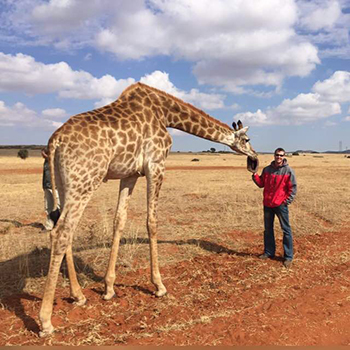
Dr Francois Deacon, specialised researcher
in the Department of Animal, Wildlife, and
Grassland Sciences at the University of the Free State.
Photo: Supplied
Great news for those who care about the conservation of giraffes is today’s (8 December 2016) announcement by the International Union for the Conservation of Nature (IUCN) that giraffes are now classified as ‘Vulnerable’. The species, formerly classified as ‘Least Concern’ on the IUCN Red List — an index on the likelihood of extinction of animals worldwide — is threatened with extinction.
“Until recently, few people were aware of the situation facing giraffes. It is time to show the world giraffe numbers are in danger. This reclassification by the IUCN is pivotal to get the public to stand up and take action for giraffes,” said Dr Francois Deacon, specialised researcher in the Department of Animal, Wildlife, and Grassland Sciences at the University of the Free State (UFS).
Research is essential to develop effective conservation plans for a species
Key to this announcement was the status report submitted by Dr Deacon. He was the lead author responsible for the submission of the Southern African Giraffe subspecies (Giraffa camelopardalis giraffa) status report that was part of the larger species report submitted for review by the (IUCN). The UFS has been doing many research projects in the past couple of years on giraffe-related issues and topics to address this problem.
The UFS is one of only a few universities in Africa that is committed to studying giraffes to ensure the conservation of this species for generations to come.
“The reclassification of giraffes to ‘Vulnerable’
status, by the IUCN, is pivotal to get the public
to stand up and take action for giraffes.”
A 40% decline in the giraffe population over the past two decades is proof that the longnecks are officially in trouble. According to Dr Deacon, this rate of decline is faster than that of the elephant or rhino. The main reasons for the devastating decline are habitat loss, civil unrest and illegal hunting.
Dr Deacon, pioneer in the use of GPS technology to study giraffes and their natural habitat, said “This vulnerability clearly stipulates we are quickly losing grip on our last few natural populations”. He and a team of researchers at the UFS in South Africa are leading various research and conservation projects to help save the last remaining giraffes in Africa.
Giraffes moved from ‘least concern’ to ‘vulnerable’ on the Red List
The IUCN, a health check for our planet, is the highest level at which decision-makers can prove how many species (fauna or flora) are surviving or not. The update from ‘Least Concern’ to ‘Vulnerable’ on the Red List was released at the 13th Conference of the Parties to the Convention on Biological Diversity in Cancun, Mexico.
A wildlife documentary, Last of the Longnecks clearly shows how the number of giraffes has plummeted in the past two decades from 154 000 to fewer than 98 000 today — with numbers of some giraffes, such as Kenya’s reticulated giraffe, declining by as much as 80%.
Any individual or institution that wants to make a contribution relating to giraffe research can contact Dr Deacon at the UFS on deaconf@ufs.ac.za.
In other media:
Announcement on BBC news: http://www.bbc.co.uk/news/science-environment-38240760
Time: http://time.com/3622344/giraffe-extinction/
The Telegraph: http://www.telegraph.co.uk/science/2016/12/08/giraffes-now-facing-extinction-warn-conservationists/
ABC News: http://abcnews.go.com/International/giraffes-danger-extinction-numbers-dropped/story?id=27334959
theguardian: https://www.theguardian.com/environment/2016/dec/08/giraffe-red-list-vulnerable-species-extinction
Aol: http://www.aol.co.uk/news/2016/12/07/giraffes-in-danger-of-extinction-as-population-plunges-by-up-to/
Former articles:
18 November 2016: Studies to reveal correlation between terrain, energy use, and giraffe locomotion
23 August 2016: Research on locomotion of giraffes valuable for conservation of this species
9 March 2016: Giraffe research broadcast on National Geographic channel
18 September 2015: Researchers reach out across continents in giraffe research
29 May 2015: Researchers international leaders in satellite tracking in the wildlife environment